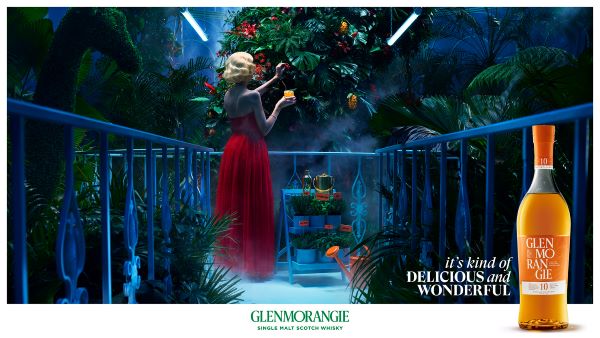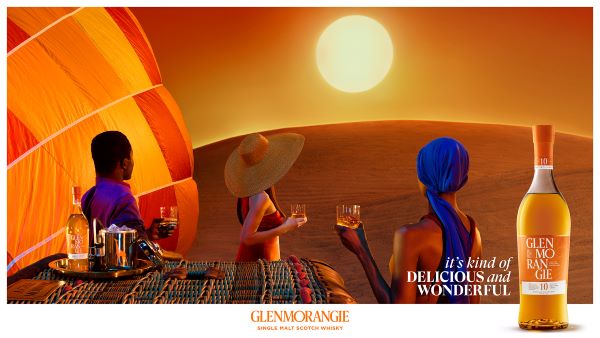Behind the Label – Glenmorangie
With no blends in its stable to worry about, Glenmorangie is wholly focused on single malts, and its mother brand has a confident swagger about it under French owners - LVMH. But it didn't start out that way, reports Tom Bruce-Gardyne …
Half-way round his grand tour of the UK's whisky distilleries in the 1870s, Alfred Barnard reached Glenmorangie on the shores of the Dornoch Firth, near Inverness. He gave it just a few paragraphs in his book, and described it as "certainly the most ancient and primitive we have seen, and now almost in ruins."
But Glenmorangie survived. In fact, it is now the world's fourth or fifth best-selling single malt under LVMH who acquired it along with its sister distillery of Ardbeg on Islay for around £300 million in 2004. This January, just six months into his new role as Glenmorangie's CEO, Caspar MacRae declared it was "only just starting to touch the sides of its opportunity."
He believes single malts "have been quite heavily dependent on the more mature Western markets," and accuses them of: "only being relevant, on many occasions, to a very small sub-set of those markets. The stereotype of the single malt drinker over the last twenty years has been somebody of a middle-aged disposition – white, western and male, and I'm conscious I'm perhaps describing myself."
Asked where in the world Glenmorangie has most room for growth, he replies: "Firstly, Latin America. Despite some challenges for Diageo and other competitors we know there's a huge love and desire for blended Scotch that I imagine, as consumers premiumise, will translate more to single malt whiskies in future." That is certainly possible, though surely not without a fight from big, premium blends like Johnnie Walker Black and Blue Label.
.jpg)
Next on his hit list is Africa, and here too MacRae shows the same unbending faith in the supremacy of malts. He calls it: "a market where, in my mind quite rightly, consumers' perception is that single malt whisky is perhaps the best spirit you can possibly buy." And he points to Africa's "very fast-growing middle class who want to be able to enjoy the best things in life."
Then there is Asia where Glenmorangie has a strong following in Japan. He is eyeing up the potential in China and India, though here LVMH does not enjoy the same distribution muscle as Diageo or Pernod Ricard with their massive Indian whisky brands. MacRae accepts he cannot compete with them toe to toe on marketing spend.
However, he feels single malts are a world apart. "I already know today how much I, or my successor, can sell in 12 years' time, so, we'll always be a category of discernment," he says. "What I mean is we'll always be a category that doesn't have the volume. Where we win, is where consumers are looking for authenticity, provenance, quality and fantastic artisanal flavours."
%20(1).jpg)
Over in America, the category's biggest market, malt sales dipped to just over 2m cases last year, from just under 2.5m in 2022 as tracked by the Distilled Spirits Council of the US. In Diageo's latest half-year results to December, net sales of its malts were down 22% in America. Whether Glenmorangie performed any better is not something MacRae will divulge.
"I think it's a challenging time, mainly because single malt whisky is not an industry that is well-disposed to managing great volatility," he says. It seems that great time lag between distilling and selling the product, the fact you cannot turn it off and on like a tap, makes it particularly vulnerable to those supply chain convulsions that happened during and after Covid.
The impulse to trade-up may have softened, but he insists it hasn't died: "I strongly believe premiumisation isn't a trend, it's actually an inherent consumer driver," he says. "I think people always want to be improving themselves and their experiences, and we all want to feel we're drinking better than our parents drank."
Self-improvement was always core to Johnnie Walker's famous ‘Keep Walking' campaign, though it may have felt a little earnest at times. Glenmorangie has taken a more playful approach with its marketing, inspired by its slightly eccentric whisky-maker, Dr Bill Lumsden.

Asked what he wanted people to know about Glenmorangie, Lumsden allegedly replied: "You don't need to know anything about it. It's simply delicious." That, and the fact he apparently thinks of flavours in terms of colours, led to the current campaign -‘It's kind of delicious and wonderful'. Words which seem to sum up the very luscious series of adverts as much as the whisky itself.
"What we wanted to impress is that, although this is a premium, aspirational category, it's accessible to all people who are willing to spend a little bit more for a delicious experience," says MacRae. "You do have to pay a premium for a single malt. The layers of craft and investment means it will always be more expensive, but that doesn't mean it's got to be exclusive to a demographic, or reserved for quiet contemplation beside the fire."
Years ago, a champagne brand that is now one of its LVMH stablemates had a rather different take on luxury: A beautiful tropical sea and on the far, distant horizon a yacht above the words: ‘For most, Krug will remain out of reach'. I don't know about you, but I think I prefer Glenmorangie's approach.

Award-winning drinks columnist and author Tom Bruce-Gardyne began his career in the wine trade, managing exports for a major Sicilian producer. Now freelance for 20 years, Tom has been a weekly columnist for The Herald and his books include The Scotch Whisky Book and most recently Scotch Whisky Treasures.
You can read more comment and analysis on the Scotch whisky industry by clicking on Whisky News.




